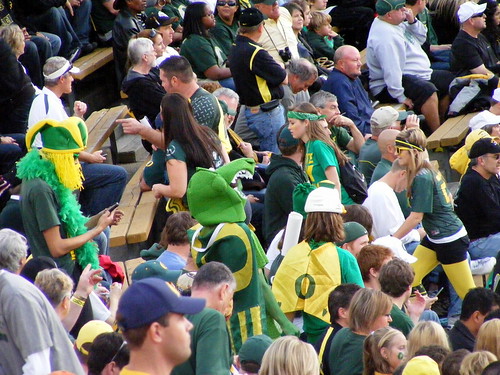
Image : http://www.flickr.com
The history of football and Yale football are more correlated than even the most devout football fans realize. Yale football has been around since the beginning of football and in many respects the Yale football program is responsible for the current game that is played on high school fields on Friday nights and in NFL stadiums on Sundays. While many people are aware that football is a modern adaptation of the game rugby (which is interestingly an adaptation of a similar game played by the ancient Greeks) few people realize how the European centric game of the nineteenth century commuted across the pond to eventually become what is by many measures the most popular sport in America.
In the mid-1800s rugby became a popular pastime on many of the New England area based college campuses that would later become known as members of the Ivy League (a distinction created only as recently as 1954). Chief amongst the rugby enthusiasts were students at Yale, Harvard, and Princeton whose taste for the game was a direct result of the English schooling many pupils had received before enrolling at these American institutions with strong ties to the United Kingdom.
The man widely credited with being the revolutionary of modern American football is Walter Camp, a Connecticut born Yale alum who by the age of only thirty-three had already acquired the title of the "Father of American Football." Camp was an 1880 graduate of Yale University and would go on to serve as the head coach at Yale from 1888-1891 before moving to the west coast to serve as the first coach at Stanford University. Camp took over the head coaching position at Stanford in the school's second season after Stanford played their inaugural 1891 season without a head coach.
Without many of the rules that Walter Camp developed while at Yale the game of football would be unrecognizable. Among the many influential adjustments credited to Camp are innovations that include:
Having downs, i.e. 1st down, 2nd down, 3rd down, and 4th down
Point system (six points for touchdowns, 3 points for field goals, etc.)
Snapping the football from the center to the quarterback
The current and often confusing rule requiring teams have seven men on the line of scrimmage (including receivers)
Inventing the safety and deciding to award it two points
By some accounts the invention of the forward pass (a debatable topic)
In addition to inventing the rules that would shape America's twenty-first century pastime Yale University in New Haven, Connecticut is the birth place of many of college football's most endearing traditions including the oldest rivalry (Harvard vs. Yale began in 1875 - Yale leads the series), the first live college mascot (the Yale bulldog known as Handsome Dan), and the first bowl stadium (the Yale Bowl) which served as the inspiration for subsequent bowls like the renowned Rose Bowl. The terms bowl game and Super Bowl both derive from the title Rose Bowl Stadium (home of the first post-season college football game) which as previously stated took its name and design from the Yale Bowl.
Perhaps most fascinating about the history of football as it relates to Yale football is that if you would have asked most Yale students in the early nineteenth century which event had more potential in terms of popularity between debate and football the overwhelming response received would have stated that debate was expected to be the more popular of the two contests. Long before there was ESPN debate contest results took front page headlines and warranted cheers from rowdy crowds as they sent their teams off to debate rival colleges. Furthering the argument that debate would outpace football in terms of popularity was the unavoidable fact that at the time football faced near extermination due to the rampant nature of serious injury.
We all know how the power struggle between debate matches and football games turned out and now as a result of reading this piece on the history of football as it relates to Yale football readers hopefully have a better understanding of how game that impacts so many lives (and advertising dollars on Super Bowl Sunday) came to be.


0 comments:
Post a Comment